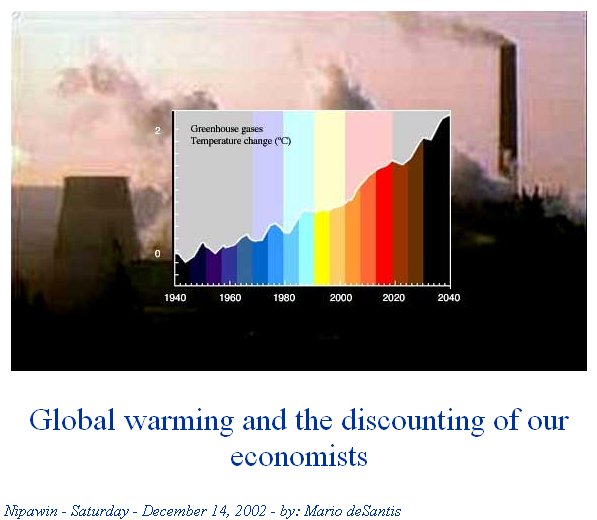Learning Stories
by
Mario deSantis
mariodesantis@hotmail.com
“I am a Canadian, free to speak without fear, free to worship in my own way, free to stand for what I think right, free to oppose what I believe wrong, and free to choose those who shall govern my country.” - -The Rt. Hon. John Diefenbaker, Canadian Bill of Rights, 1960
“The whole judicial system is at issue, it's worth more than one person.”--Serge Kujawa, Saskatchewan Crown Prosecutor, 1991
“The system is not more worth than one person's rights.”--Mario deSantis, 2002
Ensign Stories © Mario deSantis and Ensign
|
|
"It is impossible to contemplate what society will be like a century from now as technology changes"--One Economist, respondent to William Nordhaus' study on global warming, 1994 "Humanity is playing dice with the natural environment through a multitude of interventions"--William Nordhaus, 1999 I am taking a course in System Dynamics and a recurrent topic is the understanding of the so-called exponential growth or decay of our world phenomena. There is nothing in our world's phenomena that has the characteristic of either a linear growth or linear decay. The only people who accept the linearity of our world are the neoclassical economists, however, they all concede that their God, the invention of Money, has an exponential function. The House of Commons has voted for the ratification of the Kyoto protocol after all the provinces expressed their opposition to it. The strongest opposition came from Alberta which conducted a study showing that the Kyoto protocol would cost between $23 to $40 billion a year if Canada ignores economic realities. Now we all must understand that the economic realities are all preached by the top economic advisers serving the banks, the corporative business and the privatized governments. The economic implications of global warming on the Gross World Product (GWP) have been contradictory, and there are now prominent economists disputing the economic scenarios developed by the Intergovernmental Panel on Climate Change (IPCC). In 1994, economist William Nordhaus conducted a survey of distinguished economists and scientists to assess their views on the economic effects of global warming on the Gross World Product. Nordhaus found that there was a huge gulf between the estimates of the scientists compared to the economists. Reviewing the work of Nordhaus, John Sterman writes
Nobody knows who is right or wrong on the economic impact of global warming but I am very skeptical of the neoclassical economists as they exponentially discount the future dollar costs and the future dollar benefits of global warming at the expense of our children. References Kyoto could cost Canada up to $40 billion Government of Alberta, February 01, 2002 http://www.gov.ab.ca/home/news/dsp_feature.cfm?lkFid=90 Corcoran, Terence, An 'insult to science' (pdf) Leading economists want a full review of the UN's 100-year economic models for climate change, which they say contain "material errors" that invalidate temperature forecasts. November 30, 2002, National Post http://www.ftlcomm.com:16080/ensign/ensign2/pdfarchive/nationalPost/insult2science.pdf Sterman, John, Business Dynamics: Systems Thinking and Modeling for a Complex World, Irwin McGraw-Hill, 2000, page 273 http://www.mhhe.com/business/opsci/sterman/ |
